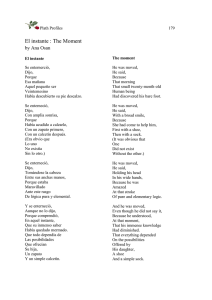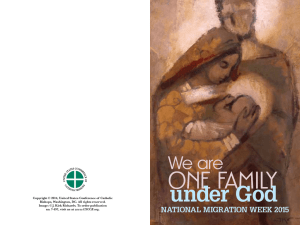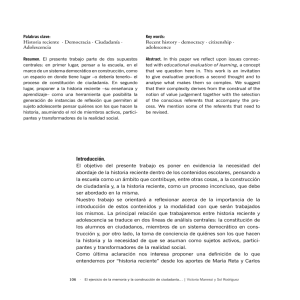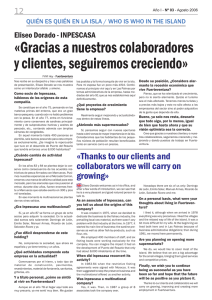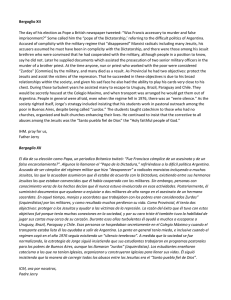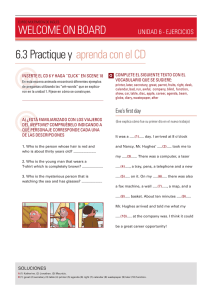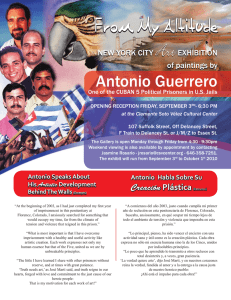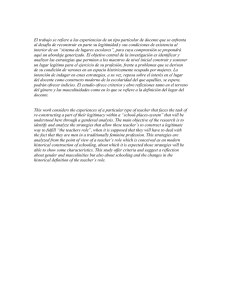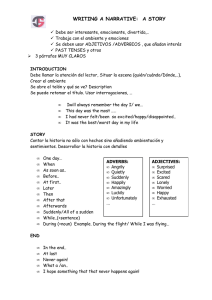CXXXVI - PROVERBIOS Y CANTARES I Nunca
Anuncio
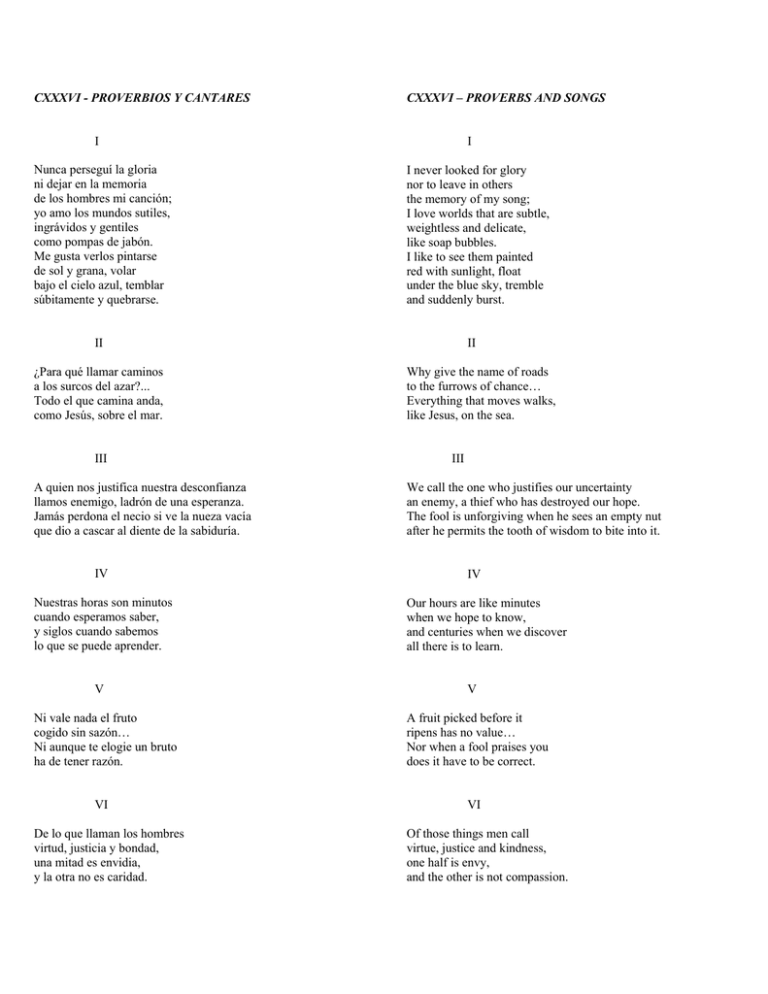
CXXXVI - PROVERBIOS Y CANTARES CXXXVI – PROVERBS AND SONGS I Nunca perseguí la gloria ni dejar en la memoria de los hombres mi canción; yo amo los mundos sutiles, ingrávidos y gentiles como pompas de jabón. Me gusta verlos pintarse de sol y grana, volar bajo el cielo azul, temblar súbitamente y quebrarse. I I never looked for glory nor to leave in others the memory of my song; I love worlds that are subtle, weightless and delicate, like soap bubbles. I like to see them painted red with sunlight, float under the blue sky, tremble and suddenly burst. II ¿Para qué llamar caminos a los surcos del azar?... Todo el que camina anda, como Jesús, sobre el mar. III A quien nos justifica nuestra desconfianza llamos enemigo, ladrón de una esperanza. Jamás perdona el necio si ve la nueza vacía que dio a cascar al diente de la sabiduría. IV Nuestras horas son minutos cuando esperamos saber, y siglos cuando sabemos lo que se puede aprender. V Ni vale nada el fruto cogido sin sazón… Ni aunque te elogie un bruto ha de tener razón. VI De lo que llaman los hombres virtud, justicia y bondad, una mitad es envidia, y la otra no es caridad. II Why give the name of roads to the furrows of chance… Everything that moves walks, like Jesus, on the sea. III We call the one who justifies our uncertainty an enemy, a thief who has destroyed our hope. The fool is unforgiving when he sees an empty nut after he permits the tooth of wisdom to bite into it. IV Our hours are like minutes when we hope to know, and centuries when we discover all there is to learn. V A fruit picked before it ripens has no value… Nor when a fool praises you does it have to be correct. VI Of those things men call virtue, justice and kindness, one half is envy, and the other is not compassion. VII Yo he visto garras fieras en las pulidas manos; conozco grajos mélicos y líricos marranos… El más truhán se lleva la mano al corazón, y el bruto más espeso se carga de razón. VIII En preguntar lo que sabes el tiempo no has de perder… Y a preguntas sin respuesta, ¿quién te podrá responder? IX El hombre, a quien el hambre de la rapiña acucia, de ingénita malicia y natural astucia, formó la inteligencia y acaparó la tierra. ¡Y aún la verdad proclama! ¡Supremo ardid de guerra! X La envidia de la virtud hizo a Caín criminal. ¡Gloria a Caín! Hoy el vicio es lo que se envidia más. XI La mano piadoso nos quita siempre honor; más nunca ofende al darnos su mano el lidiador. Virtud es fortaleza, ser bueno es ser valiente; escudo, espada y maza llevar bajo la frente; porque el valor honrado de todas armas viste: no sólo para, hiere, y, más que aguarda, embiste. Que la piqueta arruine, y el látigo flagele; la fragua ablande el hierro, la lima pula y gaste, y que el buril burile, y que el cincel cincele, la espada punce y hienda y el gran martillo aplaste. XII ¡Ojos que a la luz se abrieron un día para, después, ciegos tornar a la tierra, hartos de mirar sin ver! VII I have seen fierce claws on elegant hands; I known melodious crows and lyrical pigs… The biggest rascal places his hand on his heart, and the dumbest fool thinks he knows what is best. VIII You don’t waste your time by asking what you know… As for questions with no answer, who could ever respond? IX Man, who is goaded by a hunger for thievery, by innate malice and natural cleverness, used his intelligence to take over the earth. He even proclaims the truth! The best trick of war! X His envy of virtue made Cain a criminal. Good for Cain! Today vice is what is envied most. XI A merciful hand will always diminish our honor, but it never offends us to shake the hand of a fighter. There is virtue in strength, to be courageous is good; carry shield, sword and hammer under your banner, because courage that is honorable wields all weapons: it not only parries, it wounds and, instead of waiting, it attacks. Let the pickaxe destroy and let the whip scourge; let the forge melt iron, let the file rasp and wear down, let the burin carve and let the chisel gouge, let the sword cleave and pierce and let the great hammer smash. XII Eyes that one day opened to the light and then are blind when they return to the earth, sick of looking without seeing! XIII XIII Es el mejor de los buenos quien sabe que en esta vida todo es cuestión de medida: un poco más, algo menos… It is the very best person who realizes that in this life it is all a question of measure: a little more, a little less… XIV XIV Virtud es la alegría que alivia el corazón más grave y desarruga el ceño de Catón. El bueno es el que guarda, cual venta del camino, para el sediento el agua, para el borracho el vino. XV Cantad conmigo en coro: Saber, nada sabemos, de arcano mar vinimos, a ignota mar iremos… Y entre los dos misterios está el enigma grave; tres arcas cierra una desconocida llave. La luz nada ilumina y el sabio nada enseña. ¿Qué dice la palabra? ¿Qué el agua de la peña? XVI El hombre es por natura la bestia paradójica, un animal absurdo que necesita lógica. Creó de nada un mundo y, su obra terminada, “Ya estoy en el secreto—se dijo—, todo es nada”. XVII El hombre sólo es rico en hipocresía. En sus diez mil disfraces para engañar confía; y con la doble llave que guarda su mansión para la ajena hace ganzúa de ladrón. XVIII ¡Ah, cuando yo era niño soñaba con los héroes de la Ilíada! Áyax era más fuerte que Diomedes, Héctor, más fuerte que Áyax, y Aquiles el más fuerte; porque era el más fuerte… ¡Inocencias de la infancia! Ah, cuando yo era niño soñaba con los héroes de la Ilíada! Virtue is a blessing that lightens the heaviest heart and even smoothes the brow of Cato. Good is the one who, like a roadside inn, keeps water for the thirsty and wine for the drunkard. XV Repeat after me: As for knowing, we know nothing: from an arcane sea we came, to an unknown sea we go… And between these two mysteries is the grave enigma; three chests are locked by an unknown key. Light illumines nothing and the sage teaches nothing. What can the word say? Or the water of the rock? XVI Man is by nature a paradoxical beast, an absurd animal who needs logic. He made a world from nothing, and when he was done he said: “Now I know the secret. Everything is nothing.” XVII Only man is rich in hypocrisy. He trusts in his ten thousand disguises to deceive; and with the double key that locks his house he makes a robber’s lock-pick for his neighbor’s. XVIII Ah, when I was a child I dreamed about the heroes of the Iliad! Ajax was stronger than Diomedes, Hector, stronger than Ajax, and Achilles the strongest; because he was the strongest… The innocence of childhood! Ah, when I was a child I dreamed about the heroes of the Iliad! XIX El casca-nueces-vacías, Colón de cien vanidades, vive de supercherías que vende como verdades. XX ¡Teresa, alma de fuego; Juan de la Cruz, espíritu de llama, por aquí hay muchos fríos padres, nuestros corazoncitos de Jesús se apagan! XXI Ayer soñé que veía a Dios y que a Dios hablaba; y soñé que Dios me oía… Después soñé que soñaba. XXII Cosas de hombres y mujeres, los amoríos de ayer, casi los tengo olvidados, si fueron alguna vez. XXIII No extrañéis, dulces amigos, que esté mi frente arrugada; yo vivo en paz con los hombres y en guerra con mis entrañas. XXIV De diez cabezas, nueve embisten y una piensa. Nunca extrañéis que un bruto se descuerne luchando por la idea. XXV Las abejas de las flores sacan miel, y melodía del amor, los ruiseñores; Dante y yo—perdón señores—, trocamos—perdón Lucía—, el amor en Teología. XIX The trickster with empty morals, Columbus with a hundred vanities, lives by falsehoods which he passes off as truths. XX Teresa, soul of fire, Juan de la Cruz, spirit of flames, around here there are many cold fathers, our little-hearts-of-Jesus are going out! XXI Yesterday I dreamed that I saw God and I was speaking to Him; and I dreamed that God heard me… Then I dreamed that I was dreaming. XXII Things of men and women, yesterday’s love affairs, I have almost forgotten if they ever existed. XXIII Don’t be surprised, dear friends, that my forehead is wrinkled; I live in peace with men and at war with my insides. XXIV Out of ten heads, nine attack and one thinks. Never be surprised when a fool breaks his neck wrestling with an idea. XXV Bees make honey from flowers, and nightingales, melody from love; Dante and I—pardon me gentlemen— convert—pardon me Lucía— love into Theology. XXVI Poned sobre los campos un carbonero, un sabio y un poeta. Veréis cómo el poeta admira y calla, el sabio mira y piensa… Seguramente, el carbonero busca las moras o las setas. Llevadlos al teatro y sólo el carbonero no bosteza. Quien prefiere lo vivo a lo pintado es el hombre que piensa, canta o sueña. El carbonero tiene llena de fantasías la cabeza. XXV Put a coalman*, a wise man and a poet in charge of affairs. You will see how the poet wonders in silence, the wise man contemplates and thinks… The coalman will probably go looking for blackberries or mushrooms. Take them to the theater and only the coalman doesn’t yawn. The one who prefers the vital to the imaginary is the man who thinks, sings or dreams. The coalman has his head full of imaginary fantasies. *Machado’s “coalman” represents a person with blind faith. XXVII ¿Dónde está la utilidad de nuestras utilidades? Volvamos a la verdad: vanidad de vanidades. XXVIII Todo hombre tiene dos batallas que pelear: en sueños lucha con Dios; y despierto, con el mar. XXIX Caminante, son tus huellas el camino y nada más; caminante, no hay camino, se hace camino al andar. Al andar se hace camino, y al volver la vista atrás se ve la senda que nunca se ha de volver a pisar. Caminante, no hay camino, sino estellas sobre la mar. XXX El que espera desespera, dice la voz popular. ¡Qué verdad tan verdadera! La verdad es lo que es, y sigue siendo verdad aunque se piense al revés. XXVII Where is the utility of our utilities? Let’s get back to the truth: vanity of vanities. XXVIII Every man has two battles to fight: in dreams he struggles with God; and awake, with the sea. XXIX Traveler, your footsteps are the road and nothing more; traveler, there is no road, the road is made by walking. By walking the road is made and when we turn to look back we see the path that will never be traveled again. Traveler, there is no road, only tracks of foam on the sea. XXX He who hopes despairs, says the popular refrain. What a truthful truth! The truth is what it is, and it continues to be true, although we may think the opposite. XXXI Corazón, ayer sonoro, ¿ya no suena tu moneda de oro? Tu alcancía, antes que el tiempo la rompa ¿se irá quedando vacía? Confiemos en que no será verdad nada de lo que sabemos. XXXII ¡Oh fe del meditabundo! ¡Oh fe después de pensar! Sólo si viene un corazón al mundo rebosa el vaso humano y se hincha el mar. XXXI Heart that was once vibrant, does your golden coin no longer jingle? Before time breaks your piggybank, will it finally be empty? Let us hope that nothing we know will ever be the truth. XXXII Oh, faith of one who meditates! Oh, faith that comes from thinking! Only when a heart enters the world does the human glass overflow and swell the sea. XXXIII XXXIII Soñé a Dios como una fragua de fuego, que ablanda el hierro, como un forjador de espadas, como un bruñidor de aceros que iba firmando en las hojas de luz: Libertad – Imperio. I dreamed of God as a fiery forge that melts iron, as a forger of swords, as a polisher of steel, who was inscribing “Freedom,” “Empire” on waves of light. XXXIV XXXIV Yo amo a Jesús, que nos dijo: Cielo y Tierra pasarán. Cuando Cielo y Tierra pasen mi palabra quedará. ¿Cuál fue, Jesús, tu palabra? ¿Amor? ¿Perdón? ¿Caridad? Todas tus palabras fueron una palabra: Velad. XXXV Hay dos modos de conciencia: una es luz, y otra paciencia. Una estriba en alumbrar un poquito el hondo mar; otra, en hacer penitencia con caña o red, y esperar el pez, como pescador. Dime tú: ¿cuál es mejor? ¿Conciencia de visionario que mira en el hondo acuario peces vivos, I love Jesus who told us: Heaven and Earth will pass away. When Heaven and Earth pass my word will remain. Jesus, what was your word? Love? Pardon? Compassion? All of your words expressed only one thing: Wake up. XXXV There are two modes of consciousness: one is light, and the other patience. One consists of shining a bit of light into the depths of the sea; the other, in doing penance with a pole or a net and waiting for the fish, like a fisherman. Tell me: which is best? Visionary consciousness that beholds in the deep aquarium live fish, fugitivos, que no se pueden pescar, o esa maldita faena de ir arrojando a la arena, muertos, los peces del mar? XXXVI Fe empirista. Ni somos ni seremos. Todo nuestro vivir es emprestado. Nada trajimos; nada llevaremos. XXXVII ¿Dices que nada se crea? No te importe, con el barro de la tierra haz una copa para que beba tu hermano. XXXVIII ¿Dices que nada se crea? Alfarero, a tus cacharros. Haz tu copa y no te importe si no puedes hacer barro. XXXIX Dicen que el ave divina, trocada en pobre gallina por obra de las tijeras de aquel sabio profesor (fue Kant un esquilador de las aves altaneras; toda su filosofía un sport de cetrería), dicen que quiere saltar las tapias del corralón y volar, otra vez, hacia Platón. ¡Hurra! ¡Sea! ¡Feliz será quien lo vea! swimming freely, that cannot be caught, or that accursed task of throwing on the sand, dead, those fish of the sea? XXXVI Empirical faith. We neither are nor will be. All our life is borrowed. We came with nothing; we will leave with nothing. XXXVII You say nothing is created? Don’t worry, with the clay from the earth make a cup so your brother can drink. XXXVIII You say nothing is created? Potter, mind your pots. Make your cup and don’t worry if you can’t make clay. XXXIX They say the divine bird was changed into a chicken by the scissors of that wise professor (Kant was a shearer of arrogant birds; his entire philosophy a sport of falconry). They say he wants to jump the walls of his corral and fly once more toward Plato. Hooray! So be it! Happy is the one who can see it! XL Sí, cada uno y todos sobre la tierra iguales: el ómnibus que arrastran dos pencos matalones, por el camino, a tumbos, hacia las estaciones, el ómnibus completo de viajeros banales, y en medio un hombre mudo, hipocondríaco, austero, a quien se cuentan cosas y a quien se ofrece vino… Y allá, cuando se llegue, ¿descenderá un viajero no más? ¿O habránse todos quedado en el camino? XLI Bueno es saber que los vasos no sirven para beber; lo malo es que no sabemos para qué sirve la sed. XLII ¿Dices que nada se pierde? Si esta copa de cristal se me rompe, nunca en ella beberé, nunca jamás. XLIII Dices que nada se pierde y acaso dices verdad; pero todo lo perdemos, y todo nos perderá. XLIV Todo pasa y todo queda; pero lo nuestro es pasar, pasar haciendo caminos, caminos sobre la mar. XLV Morir… ¿Caer como gota de mar en el mar inmenso? ¿O ser lo que nunca he sido: uno, sin sombra y sin sueño, un solitario que avanza sin camino y sin espejo? XL Yes, each and everyone on earth is equal: the omnibus pulled down the road toward the stations, jerkily, by two sorry nags; the omnibus full of common travelers, and in their midst a silent man, melancholy and austere, to whom they say things, to whom they offer wine… And then, when they arrive, will only one traveler get off? Or will everyone still be on the road? XLI It’s good to know when glasses are no good for drinking; the bad thing is we don’t know what good is our thirst. XLII You say that nothing is lost? If this fragile glass breaks on me, I will never, ever drink from it again. XLIII You say that nothing is lost and perhaps you are right; but we lose everything, and everything makes us lose. XLIV All passes and all remains; but our destiny is to pass, to pass making paths, making paths over the sea. XLV To die… To fall like a drop of the sea into the immense sea? Or to be what I have never been: an individual, without a shadow or a dream, a solitary figure who walks forward without a path or a mirror? XLVI Anoche soñé que oía a Dios gritándome: ¡Alerta! Luego era Dios quien dormía, y yo gritaba: ¡Despierta! XLVII Cuatro cosas tiene el hombre que no sirven en la mar: ancla, gobernalle y remos y miedo de nafragar. XLVIII Mirando mi calavera un nuevo Hamlet dirá: He aquí un lindo fósil de una careta de carnaval. XLIX Ya noto, al paso que me torno viejo, que en el inmenso espejo, donde orgulloso me miraba un día, era el azogue lo que yo ponía. Al espejo del fondo de mi casa una mano fatal va rayendo el azogue, y todo pasa por él como la luz por el cristal. L —Nuestro español bosteza. ¿Es hambre? ¿Sueño? ¿Hastío? Doctor, ¿tendrá el estómago vacío? —El vacío es más bien en la cabeza. LI Luz del alma, luz divina, faro, antorcha, estrella, sol… Un hombre a tientas camina; lleva a la espalda un farol. XLVI Last night I dreamed I heard God shouting at me: Watch out! Then it was God who was sleeping and I was shouting: Wake up! XLVII Man has four things that are no good at sea: anchor, rudder and oars and the fear of sinking. XLVIII Looking at my skull a new Hamlet will say: here we have a nice fossil of a carnival mask. XLIX As I am growing older I notice that in the immense mirror where I once looked at myself with pride, it was I who was putting on the quicksilver. In the mirror in the back of my house a fatal hand is scratching the quicksilver, and now everything passes through it like light through glass. L “Our Spaniard is yawning. Is it hunger? Fatigue? Boredom? Doctor, can he have an empty stomach?” “No, the emptiness is in his head.” LI Light of the soul, light divine, lamplight, torch, star, sun… A man gropes his way forward; behind his back is a shining light. LII LII Discutiendo están dos mozos si a la fiesta del lugar irán por la carretera o a campo traviesa irán. Discutiendo y disputando empiezan a pelear. Ya con las trancas de pino furiosos golpes se dan; ya se tiran de las barbas, que se las quieren pelar. Ha pasado un carretero, que va cantando un cantar: “Romero, para ir a Roma, lo que importa es caminar; a Roma por todas partes, por todas partes se va”. Two young men are debating whether to go a party by following the highway or by going cross-country. Quarreling and arguing they begin to fight. First they club each other furiously with pine cudgels, then each grabs the other’s beard and tries to yank it out. A cart driver has passed by and is singing a song: “Pilgrim, to get to Rome what matters is to travel; all ways lead to Rome, any way will get you there.” LIII LIII Ya hay un español que quiere vivir y a vivir empieza, entre una España que muere y otra España que bosteza. Españolito que vienes al mundo, te guarde Dios. Una de las dos Españas ha de helarte el corazón. Now there is a Spaniard about to be born, and he begins to live between a Spain that is dying and another Spain that yawns. God help you, young Spaniard, as you enter this world. One of these two Spains is bound to freeze your heart.
